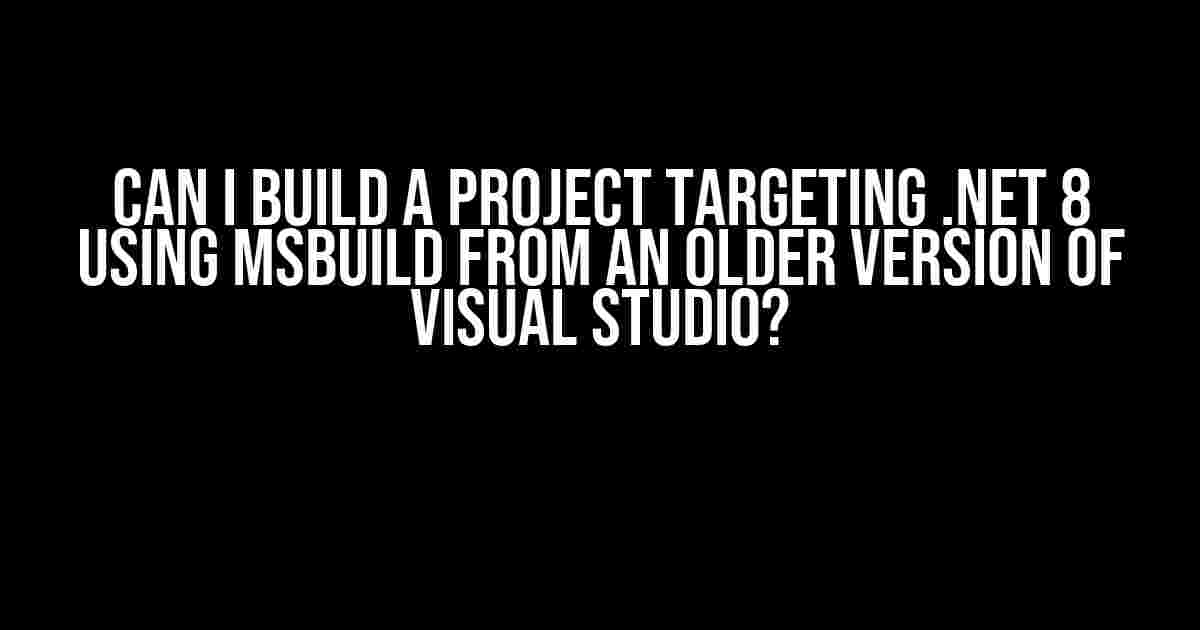Are you stuck with an older version of Visual Studio and wondering if you can still build a project targeting the latest .NET 8 framework using MSBuild? Well, you’re in luck because the answer is yes, you can! In this article, we’ll explore the possibilities and provide a step-by-step guide on how to make it happen.
What’s the catch?
Before we dive into the solution, let’s understand the underlying issue. MSBuild, the build tool for .NET, is tightly coupled with the version of Visual Studio you’re using. When you install Visual Studio, it comes with a specific version of MSBuild that’s compatible with the .NET frameworks it supports. For example, Visual Studio 2022 comes with MSBuild 17, which is compatible with .NET 6 and earlier.
However, when .NET 8 arrived, it introduced new features and changes that require a newer version of MSBuild. If you try to build a .NET 8 project using an older version of MSBuild, you’ll hit a roadblock. That’s where our solution comes in.
The solution: Using a standalone MSBuild installation
The good news is that you don’t need to upgrade your Visual Studio installation to build a .NET 8 project. Instead, you can use a standalone MSBuild installation that’s compatible with .NET 8. Here’s how:
Step 1: Download and install .NET 8 SDK
First, you need to download and install the .NET 8 SDK on your machine. This will provide you with the necessary runtime and tools to build .NET 8 projects. You can download the SDK from the official .NET website.
https://dotnet.microsoft.com/download/dotnet/8.0Make sure to select the correct version (x64 or x86) that matches your system architecture.
Step 2: Download and install MSBuild 18
Next, you need to download and install MSBuild 18, which is compatible with .NET 8. You can download the MSBuild installer from the official Microsoft website.
https://aka.ms/vs/17/release/vs_buildtools.exeSelect the “MSBuild” component during the installation process to ensure you get the correct version.
Step 3: Update your project file
Now, open your .NET 8 project in a text editor (not Visual Studio) and update the project file to point to the new MSBuild installation. Look for the `
<Project Sdk="Microsoft.NET.Sdk">
<PropertyGroup>
<TargetFramework>net8.0</TargetFramework>
<MSBuildToolsVersion>18.0</MSBuildToolsVersion>
</PropertyGroup>
...
</Project>Step 4: Build your project using MSBuild 18
Finally, open a command prompt or terminal and navigate to your project directory. Run the following command to build your project using MSBuild 18:
"c:\Program Files\Microsoft Visual Studio\2022\BuildTools\MSBuild\18.0\Bin\msbuild.exe" MyProject.csproj /t:RebuildReplace `c:\Program Files\Microsoft Visual Studio\2022\BuildTools\MSBuild\18.0\Bin` with the actual path to your MSBuild 18 installation. Also, replace `MyProject.csproj` with the name of your project file.
Troubleshooting common issues
During the process, you might encounter some common issues. Here are some troubleshooting tips to help you overcome them:
-
MSBuild 18 not found
If you get an error saying MSBuild 18 is not found, ensure that you’ve installed it correctly and the path is correct in your project file.
-
.NET 8 SDK not found
If you get an error saying the .NET 8 SDK is not found, ensure that you’ve installed it correctly and the path is correct in your project file.
-
Incompatible MSBuild version
If you get an error saying the MSBuild version is incompatible, ensure that you’re using MSBuild 18 and not an earlier version.
Conclusion
In this article, we’ve shown you how to build a .NET 8 project targeting the latest framework using MSBuild from an older version of Visual Studio. By installing a standalone MSBuild 18 installation and updating your project file, you can overcome the limitations of your older Visual Studio version.
Remember, this solution is not limited to .NET 8; you can use this approach to build projects targeting newer .NET frameworks using older versions of Visual Studio. Just make sure to download the correct version of MSBuild and the .NET SDK that matches your target framework.
Happy building!
| Visual Studio Version | MSBuild Version | .NET Framework Support |
|---|---|---|
| Visual Studio 2022 | MSBuild 17 | .NET 6 and earlier |
| Standalone MSBuild 18 | MSBuild 18 | .NET 8 and later |
Note: The above table is not an exhaustive list, but it gives you an idea of the MSBuild versions and their corresponding .NET framework support.
Frequently Asked Question
Are you wondering if you can build a project targeting .NET 8 using msbuild from an older version of Visual Studio? Well, let’s dive into the answers!
Can I use msbuild from Visual Studio 2019 to build a .NET 8 project?
Unfortunately, the answer is no. msbuild from Visual Studio 2019 is not compatible with .NET 8. You’ll need to use a newer version of Visual Studio or msbuild to build a .NET 8 project.
What is the minimum version of Visual Studio required to build a .NET 8 project with msbuild?
You’ll need Visual Studio 2022 (version 17.0 or later) to build a .NET 8 project with msbuild. This version of Visual Studio comes with the required msbuild version that supports .NET 8.
Can I use msbuild from the .NET 8 SDK to build a project targeting an older .NET version?
Yes, you can! The .NET 8 SDK includes a version of msbuild that is backward compatible with older .NET versions. Just make sure to specify the correct target framework in your project file.
Will my .NET 8 project work on older versions of Windows?
.NET 8 requires Windows 10 (version 1607 or later) or Windows Server 2016 (or later). If you need to support older versions of Windows, you may need to consider targeting an older .NET version.
Are there any limitations when building a .NET 8 project with msbuild?
Some older msbuild features may not be compatible with .NET 8. Additionally, some features may require newer versions of msbuild or Visual Studio. Be sure to check the official .NET documentation for specific requirements and limitations.

